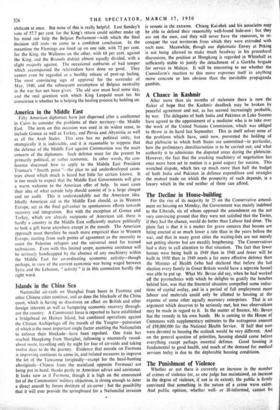America in the Middle East
Fifty American diplomats have just dispersed after a conference In Cairo to consider the problems of their territory—the Middle East. The term on this occasion was used in its widest sense, to include Greece as well as Turkey, and Persia and Abyssinia as well as all the Arab States. This area has no political unity, but strategically it is indivisible, and it is reasonable to suppose that the defence of the Middle East against Communism was the main concern of the diplomats. Such defence must for the present be primarily political, or rather economic. In other words, the con- ference discussed how to apply to the Middle East President Truman's " fourth point "—the plan to aid underdeveloped coun- tries about which much is heard but little for certain known. It is too much to expect that the Middle East Governments will give a warm welcome to the American offer of help. In most cases their idea of what outside help should consist of is a large cheque and no audit. This is understandably not the American idea. Ideally American aid in the Middle East should, as in Western Europe, act as the final galvaniser to spontaneous efforts towards recovery and integration. But with the exception of Greece and Turkey, which are already recipients of American aid, there is hardly a country in the Middle East sufficiently mature politically to look a gift horse anywhere except in the mouth. The American approach must therefore be much more empirical than in Western Europe, starting from such points of agreement as the necessity to assist the Palestine refugees and the universal need for trained technicians. Even with this limited scope, economic assistance will be seriously handicapped by the absence of any machinery within the Middle East for co-ordinating economic activity—though perhaps, in view of the current economic war being waged between Syria and the Lebanon, " activity' is in this connection hardly the right word.
•


































 Previous page
Previous page